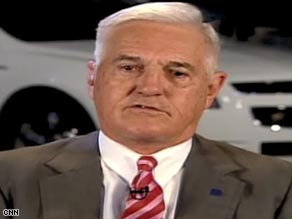(CNN) -- There's no indication when -- or if -- the White
House and congressional leaders will reach agreement on the Democrats'
proposal to give troubled U.S. automakers a financial lifeline.

General Motors exec Bob Lutz says he sees the $15 billion proposal for automakers as a "bridge loan."
General Motors Corp. and Chrysler could get $15 billion in federal
loans as soon as December 15, according to a working Democratic draft
of proposed legislation and a senior Democratic congressional aide.
Meanwhile, one key GM official already is talking about the need for
more help from the government -- even before this package's approval.
In an interview Tuesday on CNN's "American Morning," Bob Lutz, GM vice
chairman of global product development, told anchor John Roberts that
he expects the industry to go back to Washington next year for more
money.
John Roberts: A lot of taxpayers are asking if you get this $15 billion collectively, what will you do to make sure your company won't fail?
Bob Lutz: Well, first of all, GM
will only get a portion of that money and ... this is simply a bridge
loan which will get us into the next administration, where we hope we
can do something more fundamental. Because the main problem is the lack
of liquidity and the lack of revenue flowing in as we're facing
absolutely the lowest, lowest car market in history, and it's not just
the domestics, the Japanese are all down 30 percent and 40 percent.
Their inventories are piling up. You know, this isn't a question of
Detroit is in trouble; the whole automobile industry is going to be in
trouble
Roberts: You don't see Toyota and Honda coming
to the government for a handout. But based on what you said there --
that this is just the beginning -- you're going to need more money next
year?
Lutz: I think that's a reasonable assumption.
Roberts: How much more?
Lutz:
At this point, you know, that's going to have to be discussed with
Congress. We'll have to see. But this is definitely a bridge loan that
will solve the immediate liquidity problem
Roberts: When you come to Congress
next year and say, OK, you gave us $15 billion in December, now we need
X amount of money, how difficult a sales job will that be?
Lutz:
You know, I don't think anybody in Congress or the president-elect
assumes that this is all the money that is going to be required to
bridge this liquidity crisis that the American automobile industry is
facing, and, again, it all depends on how fast we have an economic
recovery. Again, let me restate this. At 10.8 or 10.5 million total
market, we do not have a viable automobile industry in this country for
anybody.
iReport.com: How is the automaker crisis affecting you? Should there be a bailout?
Roberts: Yesterday,
you took out a full page ad in the Automotive News Journal; it was a
big mea culpa. I guess on GM'S part. You said in part we acknowledge we
disappointed you. We violated your trust by letting our quality fall
and our designs become lackluster. You also laid out a GM commitment to
the American people. First thing, you said specifically we're committed
to producing automobiles you want to buy and are excited to own. There
are many people who might think that's just a fundamental tenet of free
enterprise, and why should that be revolutionary?
Lutz:
It isn't. I think people were expecting this sort of message. What
we're trying to do with an ad like that is live down this legacy of the
'80s. Everybody agrees that American cars of the '80s were not very
good and were not competitive with the Japanese. But that was a long
time ago.
We've now equaled the Japanese in productivity and
quality, and speaking for General Motors we got Car of the Year with
the Saturn Aura, Car of the Year for Chevy Malibu, Truck of the Year
with the Silverado, Green car of the Year with the Silverado hybrid,
and on and and on. Car of the Year with the Cadillac CTS.
Roberts:
One more question, Bob, certainly, as a condition of this bridge loan,
the government is going to appoint a car czar to oversee what you do
with it. They will talk about what kind of models you should build,
fuel efficiency you should get. There will be a government approval of
any vehicles you make. Who would you like to see as the car czar?
Lutz: Wait a minute. We don't know if it will be a czar or overseer. I doubt whether this person would dictate the product policy.
Roberts: Certainly an idea they are talking about. Who would you be comfortable with as car czar?
Lutz: I wouldn't even -- other than myself? Unfortunately I'm not available because I'm still gainfully employed.
Roberts: Some people [are] floating the idea maybe [that
former Massachusetts Gov.] Mitt Romney would be a good car czar. He
comes down hard on you guys. His father [George Romney] ran American
Motors for a time.
Lutz: Well, I hardly
think that the automobile business is a genetic trait, but he would
probably be satisfactory as would many other people.




